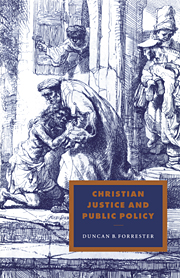PART III - THEORIES AND THEOLOGIES
Published online by Cambridge University Press: 02 November 2009
Summary
In Part II we have discussed some of the confusing difficulties ‘on the ground’, as it were, that arise when there is fundamental uncertainty about what justice is. These difficulties can be both destructive and threatening to practices and to policy-making and implementation.
In this Part we turn to consider what resources may be found in recent theories of justice. In chapter 3 we saw how many people are today rather suspicious of theory, believing it to serve sometimes to conceal what is really happening, or to justify the intolerable; and often theory is felt to be so remote from the actual issues that arise in practice that it is no longer believed to be relevant to action and to understanding.
But nonetheless theory is indispensable to illumine situations and reveal what is going on, and to guide towards coherent and consistent practice and policy.
In this book I am not concerned with an ‘in-house’ academic debate about theories of justice, but rather with the movement between theory, policy and practice. The kind of questions I will address in this Part are these: Do theories of justice illuminate what is going on? Do they articulate the demands of justice? Do they give effective guidance to practice? What kind of policy outcomes may they generate, and what kind of policies do they justify? What are the effects of these policies? Are these theories, or any of them, capable of motivating people to seek justice even if the establishment of a greater degree of justice goes against the self-interest of individuals and groups?
- Type
- Chapter
- Information
- Christian Justice and Public Policy , pp. 111 - 112Publisher: Cambridge University PressPrint publication year: 1997



